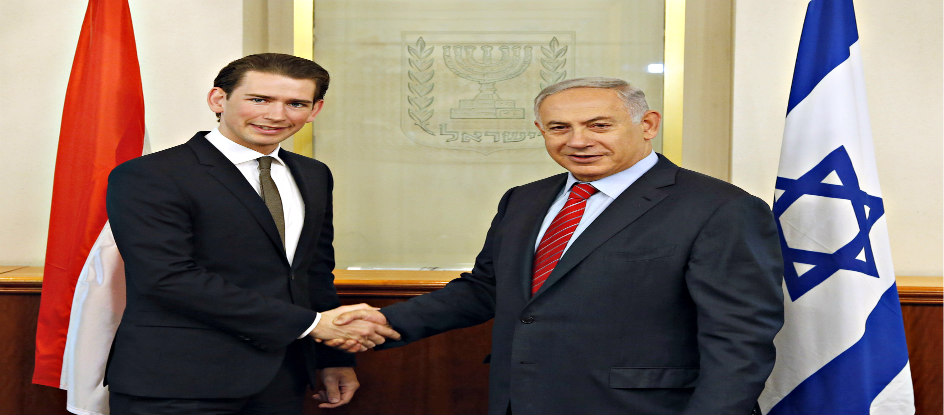Austria elected a young politician to handle the future threat but the election results indicate that the past needs to be dealt with as well

Just like the rest of Europe, Austria is facing the challenges of Muslim mass immigration and the rise of Islamic terrorism. However, unlike much of Europe, Austria has not dealt sufficiently with its troubling Nazi past.
It is therefore unsurprising that the recent Austrian elections have attracted what might appear as a disproportionate interest compared to the country’s relatively small size.
On the surface, the Austrian election results appear to follow the widespread pattern of rising European right-wing anti-immigration parties that are specifically opposed to the mass immigration from Muslim countries. European “ruling elites” too often ignore the genuine challenges from Islamist extremism and terrorism in Europe. In fact, sweeping the profound threat from radical Islam in Europe under the rug has pushed millions of Europeans into the arms of the same EU-sceptic right-wing parties that Europe’s pseudo-liberal leadership helped create by demonizing all opposition to the migrant influx as ‘racist’ and ‘Islamophobic’.
However, Austria stands out compared to most Western European states. The German right wing Alternative for Germany party (AfD) got 12.6 % of the votes in the German elections and secured seats in the Bundestag, the German parliament, for the first time. The rise of AfD can be attributed to an unprecedented increase in Islamist extremism in Germany, following Chancellor Merkel’s decision to allow more than one million Muslim migrants to enter Germany in a very short time span.
By contrast, the Austrian far-right populist Freedom Party gained 26 % of the votes in the recent Austrian elections. Despite the fact that the Islamist threat is more serious in Germany than in Austria, the Freedom Party got more than double the share of votes than German AfD. This disparity is rooted in the vast post-World War II differences between the two countries.
Unlike Germany, much of Austria is still in denial about its Nazi past. For decades after World War II, Austria continued to view itself as the first “victim” of Nazi Germany. However, this whitewashing of history ignores the fact that huge crowds of Austrians welcomed Hitler’s Anschluss – or unification – with Nazi Germany in 1938. Much of Nazi Germany’s leadership hailed from Austria, including Adolf Hitler himself, who was born in the Austrian town of Braunau am Inn. Other infamous Nazis of Austrian origin include SS officers Adolf Eichmann and Odilo Globocnik, who played key roles in the Holocaust of 6 million Jews. The Austrian Nazi official Karl Silberbauer arrested Anne Frank.
The incoming Austrian Chancellor, Sebastian Kurz, from the conservative Austrian People’s Party (ÖVP) is no Nazi. However, he lacks a parliamentary majority and is likely to form a coalition with the Freedom Party (FPÖ), which was established by former Nazis in the 1950s. FPÖ’s first leader was the SS official Anton Reinthaller.
FPÖ’s late former leader, Jörg Haider, frequently made anti-Semitic insinuations concerning “Jewish influence”. He referred to US Jewish leaders who criticized Austria as “East Coast circles.” In 2001, Haider verbally attacked Ariel Muzicant, the leader of Austria’s Jewish community. Referring to the popular detergent brand Ariel, Haider wondered how someone with the name “Ariel”, “could catch so much filth.” This was a veiled reference to anti-Semitic stereotypes of “dirty Jews” and “tricky Jews”. As late as 2002, Haider expressed support for Iraq’s despot Saddam Hussein. The leading FPÖ politician Ewald Stadler blamed 9/11 on America’s “Zionist policies”. In the Middle East, Haider was greeted as an “enemy of Israel” and had close ties with Libyan dictator Muammar Gaddafi. In 2000, Jörg Haider’s FPÖ formed a government coalition with the ÖVP.
The current FPÖ head Heinz-Christian Strache has tried to distance himself from the Haider era and even expressed unconvincing public support for Israel. While anti-Semitism is complex in the FPÖ, its main focus today is on Muslim immigration.
The international Left has displayed a profound hypocrisy when criticizing the likely coalition between Sebastian Kurz and the FPÖ. Voters punished the Austrian pro-immigration left, which leaves Kurz with few alternative options to FPÖ.
The Austrian Social Democratic Party (SPÖ) has itself a troubling relationship with Austria’s dark past. Former socialist chancellor Bruno Kreisky appointed former Nazis as members of his cabinet. When Simon Wiesenthal exposed the scandal, Kreisky delighted Austrian Nazis by demonizing Wiesenthal as a “Jewish fascist”. Kreisky also used anti-Semitic terminology when he demonized former Israeli Prime Minister Menachem Begin as, “political grocer … a little Polish lawyer,” adding, “they think in such a warped way, these Eastern [European] Jews.”
Kreisky also told an Israeli journalist, “If the Jews are a people, then they are a lousy people.” Socialist Kreisky, who developed close ties with Gaddafi and Arafat, also described Jörg Haider as “a political talent worth watching.”
Jewish Holocaust survivors, who returned to Austria after World War II, were received with either indifference or hostility. By contrast, both the socialist SPÖ and the conservative ÖVP parties were eagerly courting returning ex-Nazi voters.
The Austrian people’s choice to move to the political right follows a legitimate concern of widespread Islamic extremism and terrorism in Europe. Until Austria honestly addresses it sketchy past and faces the demons that have remained, Austrians should not be surprised by the legitimate concern the world community has with their choice.
Daniel Krygier is a writer and political analyst. He lives in Israel.
[Find this article interesting? You can find more in depth articles on Israel and the Middle East @en.mida.org.il]




WERRY GOOD NEWSE ,SWEDEN ARE VERRY BIGG ANTESIMIT CONTRY ,THE HELP ALL THE NAZZI TO ESKAPE